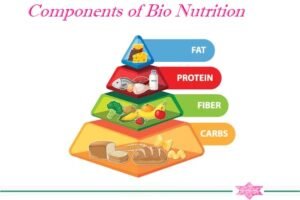What is Bio Nutrition? Unveiling the Power of Natural Nutrition
Introduction
In the realm of modern health and wellness, bio nutrition has emerged as a powerful concept that blends the benefits of nutrition and biology, creating a harmonious approach to achieving optimal health. This unique method focuses on bioavailable nutrients, which are substances that the body can easily absorb and utilize for a range of physiological functions.
Bio nutrition’s is not just about eating the right foods; it’s about understanding how the body processes nutrients and tailoring one’s diet to ensure the maximum absorption and benefit of these nutrients. As more people shift towards natural health practices, bio nutrition’s offers a more sustainable and holistic approach to well-being.
In this article, we will explore the meaning of bio nutrition’s, its benefits, its impact on health, and how you can integrate it into your lifestyle for better overall health.
Table of Contents
- What is Bio Nutrition’s?
- The Science Behind Bio Nutrition’s
- Key Components of Bio Nutrition’s
- Bio Nutrition vs. Conventional Nutrition: What’s the Difference?
- The Benefits of Bio Nutrition’s
- How Bio Nutrition Affects Your Body
- Bio Nutrition and Its Role in Disease Prevention
- Integrating Bio Nutrition’s into Your Daily Life
- Top Bio Nutrition Foods
- Frequently Asked Questions
- Conclusion
1. What is Bio Nutrition?
Bio nutrition is a modern approach to nutrition that emphasizes the body’s natural ability to absorb, metabolize, and use nutrients in the most efficient way. Unlike traditional nutrition, which might focus primarily on food quantity and calorie counting, bio nutrition’s places more importance on the quality of nutrients and how they interact with the body on a cellular level.
The term “bio” in bio nutrition comes from biology, the science of life, because it focuses on how nutrients interact with biological processes in the body. Essentially, bio nutrition is about supporting and enhancing the body’s natural biochemical pathways through food, supplements, and lifestyle choices.
2. The Science Behind Bio Nutrition
The science behind bio nutrition’s stems from a deep understanding of human biology, particularly how the body absorbs and processes nutrients. Research has shown that the body’s ability to assimilate nutrients varies based on factors such as the form of the nutrient, the presence of other nutrients, and the individual’s metabolic rate.
Bio nutrition advocates for consuming nutrients in their most bioavailable forms. Bioavailability refers to the proportion of a nutrient that enters the bloodstream when consumed and is made available for use by the body. For example, certain plant compounds are best absorbed when consumed with healthy fats, while others require specific enzymatic processes to be broken down for absorption.
3. Key Components of Bio Nutrition

Bio nutrition’s incorporates a variety of elements that contribute to health optimization. These components include:
-
Bioavailable Nutrients: These are nutrients that the body can efficiently absorb and use, such as vitamins, minerals, amino acids, and fatty acids.
-
Whole Foods: Emphasis on minimally processed, organic, and locally sourced whole foods to ensure maximum nutrient content and bioavailability.
-
Functional Foods: Foods that have a positive impact on health beyond basic nutrition, such as probiotics, prebiotics, and superfoods like spirulina and turmeric.
-
Gut Health: The gut microbiome plays a central role in nutrient absorption, and bio nutrition’s often incorporates gut health practices to optimize nutrient assimilation.
4. Bio Nutrition’s vs. Conventional Nutrition: What’s the Difference?
| Aspect | Bio Nutrition | Conventional Nutrition |
|---|---|---|
| Focus | Emphasizes bioavailability and nutrient absorption. | Focuses on calorie intake and basic macronutrients. |
| Food Quality | Prioritizes whole, organic, and minimally processed foods. | Often includes processed and refined foods. |
| Supplementation | Encourages targeted supplementation based on individual needs and biological processes. | General supplementation without a personalized approach. |
| Holistic Approach | Considers the role of gut health, metabolism, and individual variability. | Tends to focus on general dietary guidelines. |
| Scientific Basis | Strong focus on biology, molecular nutrition, and the body’s ability to absorb nutrients. | Primarily based on calories, macronutrients, and food groups. |
Bio nutrition’s differs from conventional nutrition in that it goes beyond basic food categories and calorie counting, focusing instead on the biological processes involved in nutrient absorption and utilization.
5. The Benefits of Bio Nutrition
Implementing bio nutrition into your lifestyle offers a variety of health benefits. Here are some of the key advantages:
1. Improved Nutrient Absorption
By focusing on bioavailable nutrients, bio nutrition’s ensures that your body can effectively absorb and utilize the nutrients in your food, leading to better health outcomes.
2. Enhanced Energy Levels
When the body receives optimal nutrition, it operates more efficiently. This can translate into higher energy levels throughout the day, improving productivity and reducing feelings of fatigue.
3. Reduced Risk of Chronic Diseases
A bio nutrition approach can help prevent chronic conditions such as cardiovascular diseases, diabetes, and certain cancers by promoting a balanced, nutrient-rich diet that supports long-term health.
4. Supports Weight Management
By optimizing nutrient absorption, bio nutrition’s helps regulate hunger, reduce cravings, and balance metabolism, which can aid in maintaining a healthy weight.
5. Stronger Immune System
A diet rich in bioavailable vitamins, minerals, and antioxidants supports the immune system, making the body more resistant to infections and illnesses.
6. Better Digestive Health
Bio nutrition emphasizes the importance of gut health, ensuring that digestive processes are working efficiently, which can improve overall well-being.
6. How Bio Nutrition Affects Your Body
The impact of bio nutrition on your body is profound, influencing multiple systems:
– Digestive System: A focus on high-fiber, easily digestible foods helps improve digestion and nutrient absorption.
– Circulatory System: Adequate intake of heart-healthy fats, antioxidants, and anti-inflammatory compounds supports cardiovascular health.
– Endocrine System: Balanced macronutrients and micronutrients support the function of hormones, promoting metabolic balance.
– Nervous System: Nutrients like omega-3 fatty acids, magnesium, and B-vitamins support brain function and reduce stress.
– Immune System: Bio nutrition promotes immune health by including nutrient-dense foods that boost the body’s defenses against pathogens.
7. Bio Nutrition and Its Role in Disease Prevention

Bio nutrition can play a significant role in preventing a variety of diseases, including:
- Cancer: Bioactive compounds found in fruits, vegetables, and herbs can help combat oxidative stress and reduce the risk of cancer.
- Heart Disease: A diet rich in omega-3s, antioxidants, and fiber can prevent arterial plaque buildup and lower cholesterol levels.
- Diabetes: By managing blood sugar levels through bioavailable nutrients like chromium and magnesium, bio nutrition helps in diabetes prevention and management.
- Digestive Disorders: Foods rich in probiotics, prebiotics, and digestive enzymes support gut health and prevent conditions like IBS and bloating.
8. Integrating Bio Nutrition into Your Daily Life
Adopting bio nutrition principles doesn’t require drastic lifestyle changes but rather small, impactful adjustments. Here’s how you can get started:
1. Choose Organic and Whole Foods
Opt for organic, locally grown foods to reduce exposure to pesticides and maximize nutrient content.
2. Prioritize Bioavailable Nutrients
Consume foods that are rich in bioavailable nutrients, such as leafy greens, berries, and wild-caught fish.
3. Supplement Wisely
Consider supplementing with high-quality, bioavailable vitamins and minerals that support specific health goals, such as boosting immunity or improving gut health.
4. Mind Your Gut Health
Incorporate probiotics, prebiotics, and fiber into your diet to support a healthy microbiome and improve nutrient absorption.
9. Top Bio Nutrition Foods
The following table outlines some of the best bio nutrition foods that can enhance your health:
| Food | Key Nutrients | Health Benefits |
|---|---|---|
| Leafy Greens | Vitamins A, C, K, folate, magnesium | Boosts immunity, supports bone health, improves digestion |
| Salmon (Wild-Caught) | Omega-3 fatty acids, protein, vitamin D | Supports brain function, reduces inflammation, heart health |
| Berries (Blueberries) | Antioxidants, vitamin C, fiber | Protects against oxidative stress, promotes heart health |
| Fermented Foods (Yogurt) | Probiotics, protein, calcium | Improves gut health, supports immune function, enhances digestion |
| Turmeric | Curcumin, antioxidants | Reduces inflammation, supports joint health |
| Spinach | Iron, magnesium, folate, fiber | Improves blood circulation, supports energy production |
10. Frequently Asked Questions
1. What is the difference between bio nutrition’s and organic food?
Bio nutrition’s focuses on maximizing nutrient absorption and supporting biological processes, while organic food emphasizes the absence of synthetic chemicals in farming.
2. Is bio nutrition’s suitable for everyone?
Yes, bio nutrition’s can be adapted for any lifestyle, as it focuses on optimizing nutrient intake, which is beneficial for all individuals.
3. How can I know if my body is absorbing nutrients effectively?
Consult with a healthcare provider for blood tests and assessments to determine if there are nutrient deficiencies or absorption issues.
11. Conclusion
Bio nutrition’s represents a shift in the way we approach food and nutrition’s. By focusing on bioavailability and understanding how nutrients work in harmony with our biology, we can optimize our health and prevent disease. Whether you’re looking to boost energy levels, support your immune system, or prevent chronic conditions, bio nutrition’s offers a practical, science-based solution that enhances overall well-being.
Read More Blog: Bio Oil for Acne Scars: A Comprehensive Guide to Healing and Improving Skin Appearance

Leave a Reply